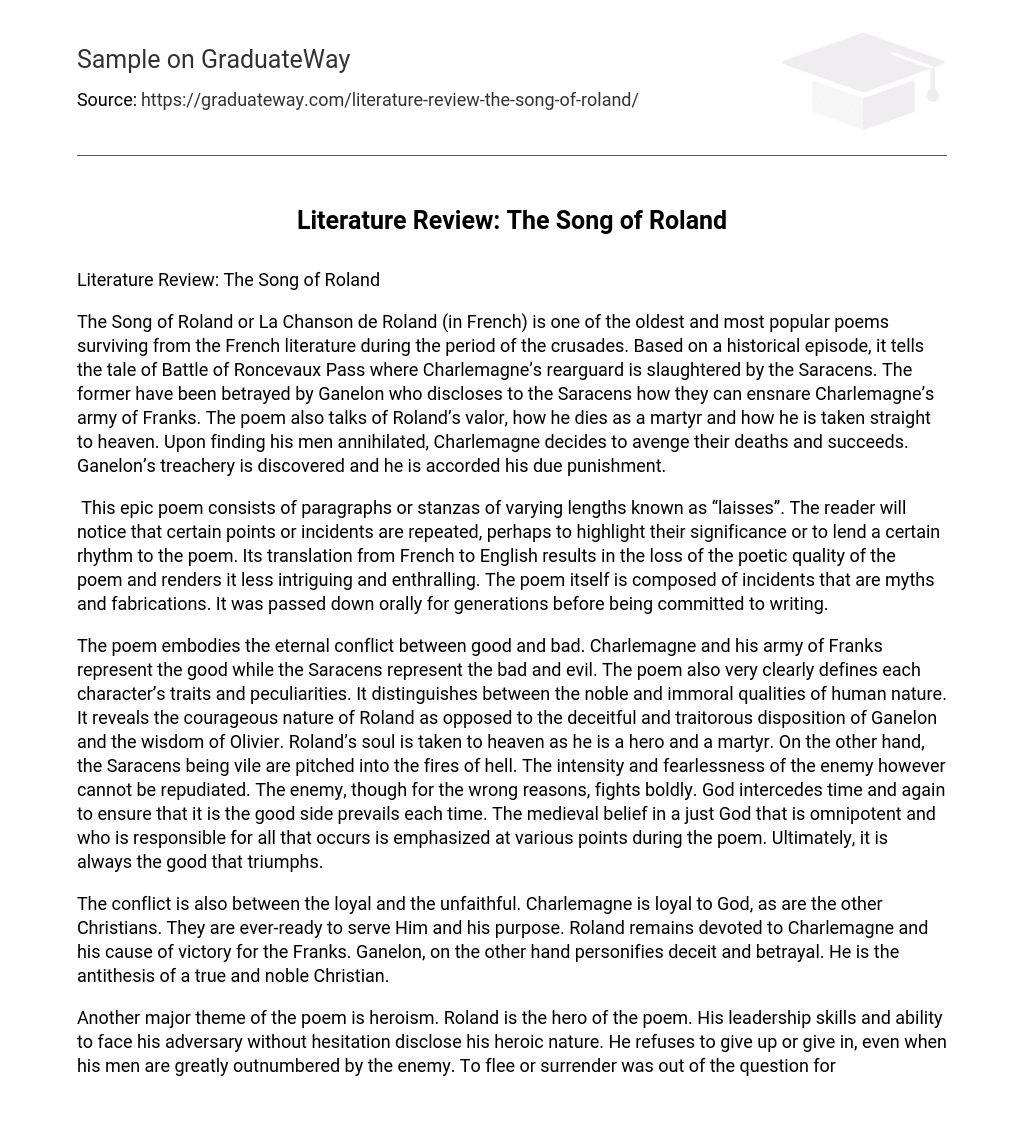The Song of Roland or La Chanson de Roland (in French) is one of the oldest and most popular poems surviving from the French literature during the period of the crusades. Based on a historical episode, it tells the tale of Battle of Roncevaux Pass where Charlemagne’s rearguard is slaughtered by the Saracens. The former have been betrayed by Ganelon who discloses to the Saracens how they can ensnare Charlemagne’s army of Franks. The poem also talks of Roland’s valor, how he dies as a martyr and how he is taken straight to heaven. Upon finding his men annihilated, Charlemagne decides to avenge their deaths and succeeds. Ganelon’s treachery is discovered and he is accorded his due punishment.
This epic poem consists of paragraphs or stanzas of varying lengths known as “laisses”. The reader will notice that certain points or incidents are repeated, perhaps to highlight their significance or to lend a certain rhythm to the poem. Its translation from French to English results in the loss of the poetic quality of the poem and renders it less intriguing and enthralling. The poem itself is composed of incidents that are myths and fabrications. It was passed down orally for generations before being committed to writing.
The poem embodies the eternal conflict between good and bad. Charlemagne and his army of Franks represent the good while the Saracens represent the bad and evil. The poem also very clearly defines each character’s traits and peculiarities. It distinguishes between the noble and immoral qualities of human nature. It reveals the courageous nature of Roland as opposed to the deceitful and traitorous disposition of Ganelon and the wisdom of Olivier. Roland’s soul is taken to heaven as he is a hero and a martyr. On the other hand, the Saracens being vile are pitched into the fires of hell. The intensity and fearlessness of the enemy however cannot be repudiated. The enemy, though for the wrong reasons, fights boldly. God intercedes time and again to ensure that it is the good side prevails each time. The medieval belief in a just God that is omnipotent and who is responsible for all that occurs is emphasized at various points during the poem. Ultimately, it is always the good that triumphs.
The conflict is also between the loyal and the unfaithful. Charlemagne is loyal to God, as are the other Christians. They are ever-ready to serve Him and his purpose. Roland remains devoted to Charlemagne and his cause of victory for the Franks. Ganelon, on the other hand personifies deceit and betrayal. He is the antithesis of a true and noble Christian.
Another major theme of the poem is heroism. Roland is the hero of the poem. His leadership skills and ability to face his adversary without hesitation disclose his heroic nature. He refuses to give up or give in, even when his men are greatly outnumbered by the enemy. To flee or surrender was out of the question for him. He even chooses not to blow the olifant horn to alert the rest of the army, as he wishes to fight the foe without aid. In the end, he dies a martyr. Charlemagne’s heroism is depicted through his relentless pursuit for vengeance for the death of his comrades.
The Song of Roland combines elements of politics, religion, morality and war to convey the message of good versus evil. It also explores the extremes existing in the nature of human beings. The strong sentiments that are expressed by the characters endow the poem with profound meaning and depth. No matter what their role, or their personality, eventually each one is simply human. This is what makes the poem one of finest and longest surviving in the world of literature.
Works Cited
Ian, Short. “Introduction”. La Chanson de Roland. France: Le Livre de Poche, 1990. 5–20.
The Song of Roland. Ann Arbor: University of Michigan Press, 1959.





